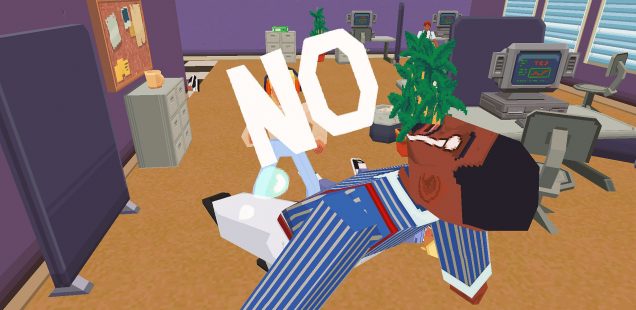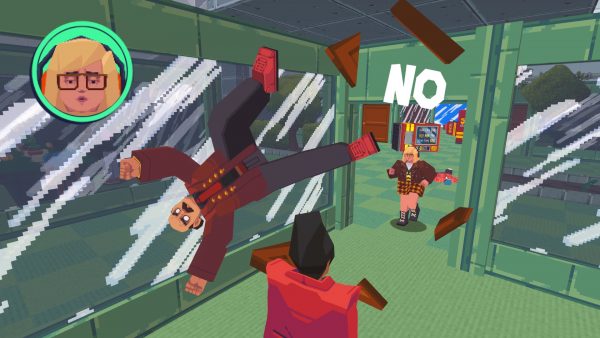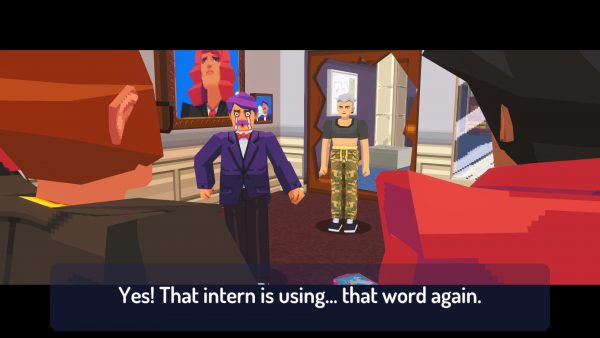
Opened World: Refusing Labor
Miguel Penabella impolitely declines.
A quick scroll through TikTok reveals a significant generational shift in attitudes towards work and success. One need only look towards the Gen Z ridicule of millennial girlboss culture to sense a new wave of social critique that skewers the girlboss archetype’s yoking of capitalism with white feminism. Originally intended to combat patriarchal corporate boardrooms, the girlboss is a state of mind, in which young women could rise from lowly entrepreneur to CEO with the right mix of ambition, self-motivation, persistence, and a disruptive attitude. It represented a fight for workplace equality, to wrest power away from men who have held it for decades. But as the above TikToks suggest, the girlboss archetype nevertheless adheres to self-interested empowerment aligned with the conservative maxim that to get ahead, all one needs to do is to simply “pull yourself up by your bootstraps.” Pressures among millennials to ascend the corporate ladder have given rise to a whole cottage industry of self-help books, podcasts, and merchandise that tout phrases like “Rise and grind” or “But first, coffee,” normalizing workaholic behavior as a necessity to get ahead. Rather than demolish patriarchy, girlboss leaders keep the system intact and excel within it, often resulting in toxic workplaces of “Instagram-ready feminism” that nevertheless conceals workplace discrimination against Black women by white women CEOs. Leigh Stein classifies it within the framework of “woke capitalism” in the essay “The End of the Girlboss Is Here,” in which corporations and social media influencers have become supposed paragons for moral leadership rather than our public institutions that have been ransacked over the decades by neoliberal policy. In this system, individual competitiveness and hustle eclipses compassion and community.
Say No! More playfully rebuts these toxic frameworks of corporate culture, exploitation, and grind. A comedy game about labor unrest, Say No! More, as its title suggests, emphasizes the power of saying NO. Its core mechanic centers on the ability to blast away onerous coworkers and supervisors by responding NO to their unreasonable demands, causing chaos in the office as the protagonist faces off against videogame bosses who are literal workplace bosses. And what does saying “no” mean in the context of a workplace? “No” means going on strike, and Say No! More plays with such radical ideas of refusing to work or capitulate to the powers that be. The game parodies office self-help maxims by taking familiar corporate values and truisms, twisting it into balloon animals, and presenting a carnivalesque menagerie of an office space like the zany vision of corporatism in Boots Riley’s film Sorry to Bother You, or similar games about cycles of work like Going Under, Katamari Damacy, and most of the titles of Molleindustria.

The game introduces its protagonist on the first day of their new job as an intern at a towering office skyscraper, alongside two other fresh-faced, overeager coworkers. When we first encounter dialogue bubbles, we can either remain silent or mumble out an embarrassed “uhh” with arms outstretched in a bashful shrug. Either way, the first few minutes of this new job are full of awkward exchanges and passive responses that open opportunity for workplace exploitation. A cloying supervisor delivering the orientation jokingly threatens to fire anyone who doesn’t laugh at his jokes, declaring, “We like to have fun around here!” He continues with the ominous advice, “You have to say YES to everything around here!” suggesting that obedience will lead to promotion and success. Presented as an on-rails experience, the game prevents players from freely moving the protagonist around the office, but instead sprints us forward through the space as we encounter different coworkers along our path. Upon discovering a self-help cassette tape—complete with energetic 1980s synthpop and a mentor dressed as a workout instructor—the protagonist unlocks the game’s core mechanics of saying NO and later, a variety of disarming techniques like laughing or sarcastically slow clapping at would-be antagonists, cutting the pride of flustered coworkers.
The mood of the game greatly shifts upon learning how to say NO, as the music quickens and interactions become snappier as the protagonist hops from person to person in the office, blowing them away with a powerful NO. Although freshly hired, the protagonist receives countless unreasonable requests from coworkers, from throwing away used tissues to skipping lunch in order to catch up on overdue work. When upper management snatches away the player-character’s lunchbox and is subsequently passed around from supervisor to supervisor, the protagonist carves a warpath throughout the game as they chase down the stolen treasure. Unleash your NO, and taxing coworkers are comically tossed aside like ragdolls, knocked over like bowling pins, and collapsed at your feet with pitiable responses like “I’m actually small!” Interactions carry the manic energy of the late capitalist hellscape of Conner O’Malley’s Hudson Yards Video Game, complete with nonsense conversations that reflect the absurdity of a corporate environment. Later, when players learn how to supercharge their NO, each act of rejection creates a hurricane-like force that sends papers flying and office furniture crashing away, greatly adding to the chaos.
An insightful video essay by eurothug4000 identifies this game as a critique of cycles of abuse in workplaces, and indeed, Say No! More centralizes the act of saying NO to comment on broken boundaries in professional settings. Many of us who work in offices, the game suggests, feel unable to be honest about our feelings and acquiesce to the demands of bosses or coworkers to avoid confrontation, to the detriment of our own mental health and energy. The cathartic NOs that players release in the office serve as a corrective to overexertion and exploitation, so that healthy boundaries are set. Sometimes, however, the game presents characters with dialogue highlighted in pink text bubbles, which are different from other employees. These represent dialogue that players are encouraged to listen to rather than dismiss outright, as these coworkers typically share worthwhile questions or compassionate thoughts. One employee asks if it’s wrong to want more out of life, and whether it’s bad not to want to work in the office forever. Another employee simply wants to show you their game, brimming with excitement to share a passion beyond just office work. In these moments, the game recognizes that while NO is a powerful tool to set healthy boundaries, it is not something to be used carelessly. Stopping to listen to coworkers’ thoughts allows you to see the beginnings of a subversive mindset among a select few, with some questioning the values of corporate culture. Still others will thank you for listening to them and upholding their dreams beyond the demands of the corporation.

As you tear apart the office, you slowly amass a following of coworkers emboldened by your rebelliousness against empty corporate platitudes that encourage unhealthy, workaholic behavior. Throughout the game, managers shill the oft-repeated corporate lie that workplace bosses are akin to friends or family, but later reveal their hypocrisies behind closed doors. At one point, you catch the tail end of a conversation with a manager who wants to rename “overtime” as “powertime,” a euphemism of hustle culture that is quickly exposed as simply a legal loophole to not pay workers overtime since that term will be discontinued. Even receiving workplace promotions are corporate traps. Despite ravaging the office, upper management finds this unruliness intimidating and tough, and they grant the protagonist a promotion to replace the cowardly floor supervisor. But this is a smokescreen, as you do not climb the corporate ladder, but must still work at the same decrepit intern desk behind the vending machine as you started. The new manager simply paints a window on the wall, calls you intern despite the promotion to a supervisor role, and steals your lunchbox yet again. How often do we experience or hear of colleagues who receive promotions, only to have more responsibilities than ever before, with seemingly little in return? In these moments, the game demonstrates how upward mobility within a corporate structure does not represent a solution, but merely a temporary salve.
Over time, your actions trigger a slow march towards class consciousness and labor organization. During an extended montage in a park outside, the protagonist can deploy NO for productive aims, such as correcting your colleagues’ self-defeating thinking and capitalist brainwashing. One coworker wishes they could work faster, and responding NO allows them to realize, “If there’s too much work, it’s the manager’s fault.” Others admit to feeling self-conscious about the sound of their laughter or their dancing skills, and saying NO snaps them out of it, breaking them from the mental shackles that bind them to fatalistic thinking. With each victory up the corporate ladder, colleagues feel more empowered to stand up for themselves and become embroiled in your cause. When a manager dismisses labor unions as a “tear-apart-ion,” a group of confused coworkers asks if the manager can fire you for starting a union, and responding NO empowers them to begin the process of starting one. Nevertheless, some remain mired in corporate truisms. The two other interns that began work with the protagonist at the beginning of the game believe that eating at their desk is efficient, rather than enjoying lunch with their fellow coworkers at the food trucks outside. Their competitive hustle leaves them feeling palpably unhappy and bitter, and the game foregrounds the contrast between them and your increasingly skeptical colleagues. The game suggests that solidarity with fellow coworkers leads to a more fulfilling and balanced lifestyle, of friendship and communal power over your bosses, rather than focusing so single-mindedly on the objectives of the company over your own self-worth.
By the end of the game, players will encounter the true CEO of the company, a parody of the girlboss archetype who claims that work is a lifestyle in her “Say Yes! More” corporate talk. She transforms the workplace into a tyrannical regime, complete with robot workers that do her bidding, CCTV cameras that constantly monitor employees, and threats to fire anyone who say NO. Say No! More offers a complex understanding of this character, depicting her trapped in a vicious cycle as victim and oppressor. Revealing to the protagonist her frustrations that she herself worked “100-hour days” and suffered through bad internships, the CEO has had to carry the burden of breaking the corporate glass ceiling to excel as a woman in a toxic, patriarchal work culture and prove her worth in such settings. But this journey up the corporate ladder has only developed a vengeful, pent-up anger and a fragile, insecure personality, as the CEO chastises the protagonist for resisting the cycles of abuse and finding the happiness that has eluded her. Territorial and self-serving in order to protect her own interests rather than that of the collective, she argues, “You could have become like me, if only you’d play by the rules!” Rather than dismantle the oppressive structures that demoralize and exploit workers, she maintains those cycles of toxicity, so that others may feel the same cruelty she herself has had to survive.

Completing the game requires that this cycle be broken. As Say No! More centralizes the theme of finding value and pride in one’s work rather than succumb to alienation in an indifferent corporate machine, the game finds the various workers standing up for themselves in a heated argument against the CEO. She admits that her life is unsustainable and unhappy, that a work culture of grind has left her unable to express vulnerability: “I wish it were okay to be weak, to be sad, but apparently that makes you selfish!” One final resounding NO overpowers this fatalistic attitude, planting a seed of corporate skepticism in her mind. “We can fix this together,” offers Noah, another intern who comes to learn the necessity of professional boundaries and workplace camaraderie. Saying NO rather than remain ambivalent and passive, the game argues, allows you to feel less distant from your colleagues. Saying NO empowers one to be more present and honest, and others will feel grateful for communication that is direct and clear. Saying NO is not evidence of an inability, lack, or weakness; it is a sign of self-worth, dignity, and a crucial understanding of one’s own abilities and power.
Miguel Penabella is a PhD student investigating slow media and game spaces. He is an editor and columnist for Haywire Magazine. His writing has been featured in Kill Screen, Playboy, Waypoint, and Unwinnable, and he blogs on Invalid Memory.